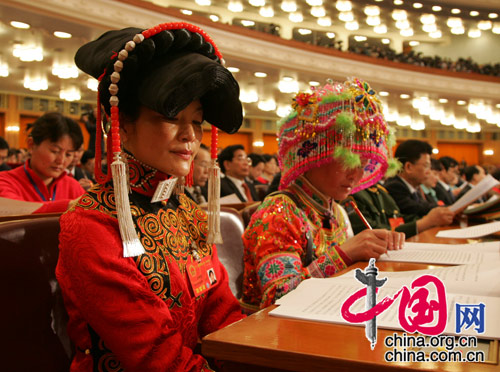Varying ways to a political career
Selection of state leaders is closely associated with political context of a certain era in China.
Those female high-level leaders whose names were on everyone's lips before China's reform and opening-up policy was implemented in 1978 feature as a characteristics of the special times.

Among them, Wu Guixian, a model worker, was deliberately promoted in the campaign of intensely building a socialistic society; Xing Yanzi and Hou Juan were chosen as typical figures to propagandize the campaign calling on young people to build themselves up in countryside; and Guo Fenglian became known to all as the Party leader of Dazhai, a typical rural Chinese village.
Generally, those female leaders at those times all had a "non-questionable" family background, and were grassroots model workers in the front line of production. Most of them were selected and promoted for political purposes, but they might not enter politics on their own initiative and they might not have the necessary talents to successively embark on a political career, and consequently, they were always looked upon as political foils.
Moreover, intellectuals and members of non-communist parties were given few chances to enter politics from 1957 to the end of 1970s.
Such phenomenon reversed after the advent of reform and opening-up policy. Intellectual females with at least a college education record have made up a prime part of China's female leaders.
What is quite noticeable is that of the nine female state leaders at present, three are members of non-communist parties. They are He Luli, vice chairwoman of the Standing Committee of the NPC and former chairwoman of the Revolutionary Committee of the Chinese Kuomintang, Zhang Meiying, vice chairwoman of the CPPCC National Committee and executive vice chairwoman of the Central Committee of the China Democratic League, and Zhang Rongming, also vice chairwoman of the CPPCC National Committee and executive vice chairwoman of the Central Committee of the China Democratic National Construction Association.
The selective channels for female leaders are now witnessing an expansion. Most of female leaders were previously selected from Party and government organizations. In recent years, more and more women who worked at fields of culture, public health and scientific research were promoted under the aegis to allow specialists to administrate the state.
However, this trend is also connected with women's status as public figures outside the Communist Party, which can be illustrated in the latest re-election of provincial leaders.
For example, Cheng Hong, newly-elected vice mayor of Beijing, was a professor of economics at the Beijing Wuzi University before entering politics, and also she was a member of the China Democratic League; Gan Lin, deputy governor of Hunan, has ever been the head of the Horticulture and Plant Institute of the Hunan Agriculture University and chairwoman of the Hunan provincial committee of Zhi Gong Party of China; Xie Ru, born in 1968, is China's youngest vice governor, and holding a doctor degree in economics, she is an expert on rural economic research and is a nonparty personage.
Besides appointment and election mechanisms, public selection has provided a new channel for women to share the stage with men to display their leadership capacity. Take the Vice Governor of Shandong Province Wang Suilian as an example, Wang embarked on her political career in 2005 via the public selection opening to vice department administrative posts.